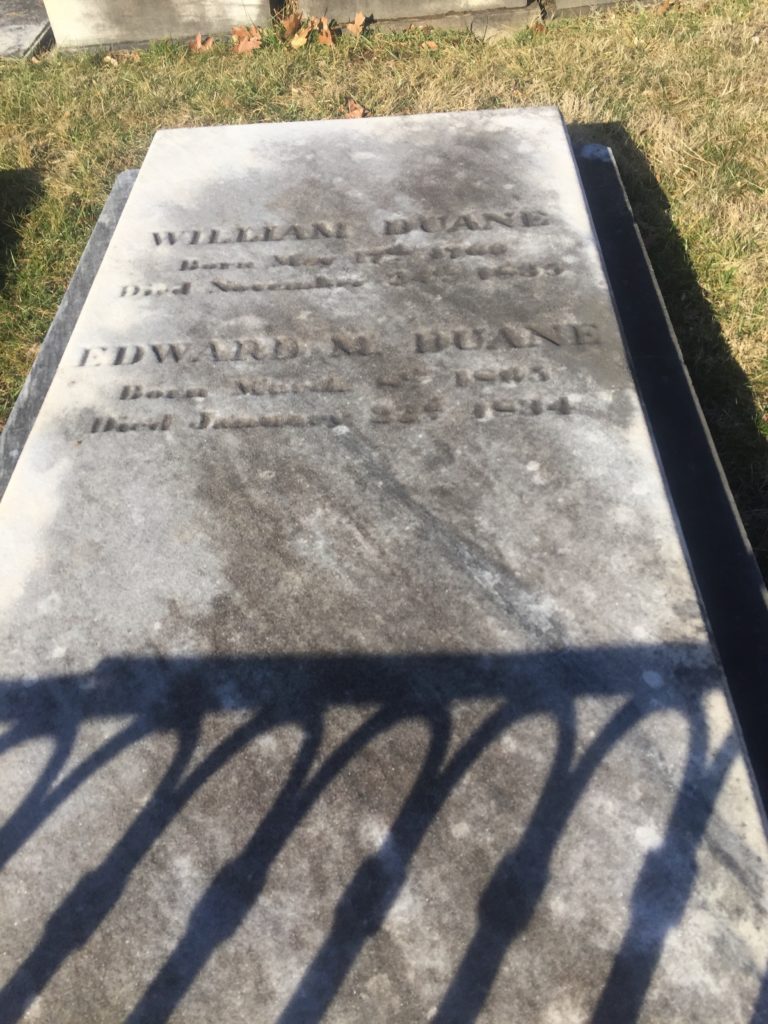Erik Visits an American Grave, Part 677
This is the grave of William Duane.

Born in Newfoundland in 1760 (Wikipedia says he was born in New York, but this is wrong and I know how shocking that is….), Duane grew up in Vermont and Philadelphia. He then left the United States for education in Ireland. He moved to India in 1788, living in Calcutta. There, he started a newspaper called the Bengal Journal in 1791. But Duane had a way of getting himself in trouble. A staunch republican, he was shut down by the colonial government the next year for taking pot shots at the French royalist government that was in exile in Calcutta.
In 1794, he was deported by the government for libel. So he returned to the United States and started a Jeffersonian newspaper in Philadelphia, the Aurora. There is actually some dispute over this fact. Some say Benjamin Franklin Bache founded the paper. But it doesn’t really matter who started it. Duane was a major leader of the paper in any case and the sole editor after Bache died. It ran for thirty years before shutting down in 1824. It soon became a flashpoint in the nation’s political struggles. Duane, nothing if not a sharp-tongued writer, engaged in withering attacks on Federalists, first the Washington and then the Adams administration. He was a huge supporter of Jefferson. In fact, Duane was a major reason for the passage of the horrible Alien and Sedition Acts, which nearly destroyed the nation’s fragile republicanism when it was just a toddler. He was twice charged with violating those laws. Timothy Pickering, who had replaced Jefferson as Secretary of State, said of Duane, “There is in the Aurora of this city, an uninterrupted stream of slander on the American government.” Remember, that in this era, “slander” meant “criticism.” Of course, it was very harsh criticism, but Federalists such as Alexander Hamilton and John Adams and Timothy Pickering simply found this unacceptable.
Duane became the guy Jeffersonians went to when they wanted to embarrass the Federalists. In 1800, Federalists floated a bill that would change how presidential elections would take place, giving themselves a greater advantage. It was bad. It would have established a special committee of six senators, six congressmen, and the Chief Justice of the Supreme Court to review electoral college ballots and decide which ones should be counted. This obviously was extremely dangerous and was to be staffed with only Federalists. Democratic-Republican senators gave Duane the text of the bill, which he published in the Aurora. Federalists ordered Duane detained and charged him with making “false, scandalous, defamatory, and malicious assertions,” mostly for the editorials that went along with the bill. Part of the charge against him is that he mistakenly wrote that the Senate had passed the bill. That was a mistake but hardly a crime against the nation. But this demonstrates just how far the Federalists were willing to go to repress dissent and criticism. Jefferson just told him to go talk to his lawyer and he never returned. The Senate charged him with contempt. He went into hiding but Congress did not prosecute him further. Then the session ended and that was it. This case has been cited in recent years as proof as to why Trump’s charges about leaking are so bad.
Jefferson credited Duane’s work with pushing him over the top in Pennsylvania and thus winning the presidency in 1800. Of course Jefferson, immediately dropped the Alien and Sedition Acts charges against him. Jefferson repaid Duane for his support, making him a lieutenant colonel in the military. He remained a leading fighter for the Jeffersonian cause. In 1811, James Madison wrote to the retired Jefferson that “I have always regarded Duane, and still regard him, as a sincere friend of liberty, and ready to make every sacrifice to its cause but that of his passions.”
During the War of 1812, Duane was an adjutant general and played a somewhat important role in the defense of Philadelphia. He kept working on the Aurora. He also wrote some books on the American military. American Military Library, or Compendium of the Modern Tactics, was published in 1809. An Epitome of the Arts and Sciences came out in 1811. Explanation of the Plates of the System of Infantry Discipline, for the United States Army was published in 1814. He also was a big supporter of anti-colonialism in Latin America. One of his best friends in Philadelphia was the Colombian freedom fighter Manuel Torres, who influenced Duane to use his newspaper to promote the cause of Latin American independence. Torres became the first official representative of the new South American governments in the U.S. Duane finally sold the Aurora in 1822. With the proceeds, he traveled to Colombia and Venezuela to celebrate their independence. Later in the 19th century, a portrait of Duane hung in the national capitol in Bogota to remember their American ally.
Duane died in 1835. He lived long enough to see his son, named for him, defy Andrew Jackson after being named Secretary of the Treasury and refuse to withdraw the federal deposits from the Bank of the United States, leading to his firing.
William Duane is buried at Laurel Hill Cemetery, Philadelphia, Pennsylvania.
This grave visit was sponsored by LGM reader donations. Many thanks! If you would like this series to visit other early American journalists, you can donate to cover the required expenses here. Isaiah Thomas is in Worcester, Massachusetts and Philip Freneau is in Matawan, New Jersey. Previous posts in this series are archived here.
